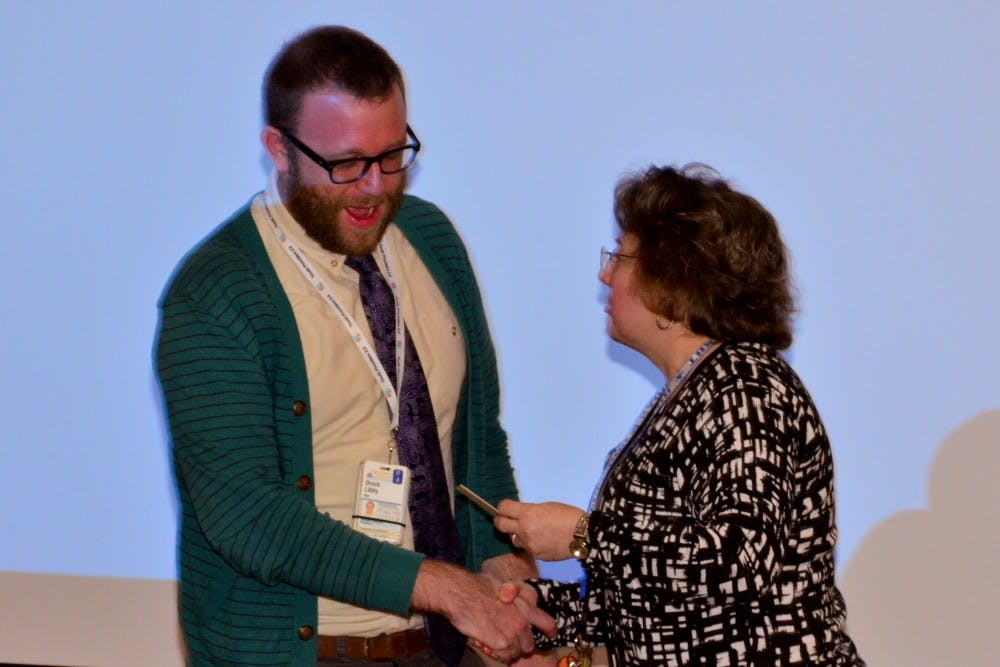Pediatric resident Dr. Brock Libby received this year’s Nancy Walton Pugh Child Advocacy Award for his work in LGBTQ youth outreach and education.
“The award was established to recognize outstanding efforts by a pediatric resident(s) whose efforts have led to the improved health and well-being of children and is awarded in recognition of an outstanding advocacy project initiated and implemented during residency,” according to the School of Medicine website.
Libby got involved with LGBTQ youth programs while attending the University of Vermont Medical School. He began working with the Richmond Organization for Sexual Minority Youth (ROSMY) shortly after starting his residency in Charlottesville.
Much of Libby’s work focuseas on transgender youth and the obstacles facing them specifically. According to Libby, the rate of attempted suicide is over 11 times higher in transgender youth than in the general population.
“I’m obviously concerned about suicide,” Libby said. “I could not be a good physician if I weren’t, but I’m mostly concerned about the feelings that lead up to suicide.”
Libby is taking a two-fold approach to this issue. The first step has been working with a pediatric endocrinologist and the medical director of the Teen Health Center to make sure the Teen Health Center can serve as a welcoming space or even a refuge for transgendered teens, especially those who may not have support at home. The second step is dealing with depression and mental health issues in general.
“Things are getting better, but there’s still a long ways to go,” Libby said. “And we definitely as pediatricians are more on top of the adolescent suicide rate, all adolescents, I’m saying, not just LGBTQ. So I think that they’re getting better, but I think there are still a lot of physicians out there who will screen a teenager for depression and find out that they’re positive and still not know what to do with it.”
An important part of taking care of young people’s physical and mental health is being able to talk openly and helpfully about their sexual health, according to Libby.
“This is going to sound ridiculous, but I just wish that people talked about sex more, because people are so uncomfortable talking about sex,” Libby said. “And it starts with a physician. If a physician is not comfortable asking someone if they have sex, they’re not going to ask it, or they’re going to ask it in a horrible way that nobody’s gonna wanna actually talk about it.”
Libby emphasized talking to LGBTQ youth about aspects that are different for them without treating them differently. For example, he says physicians can respect a young person’s gender identity while still effectively treating their physical sexual characteristics by asking whether they have a cervix (and therefore need pap smears) rather than asking if they are male or female.
“I don’t like the idea of a gay teenage boy coming in and being treated very differently from a straight teenaged boy,” Libby said. “It makes it seem like that person’s like an alien, which they’re not. In general, in society, disenfranchised groups of people are more sensitive than others, and so I think that approaching them with more sensitivity is important, and I think that there are risk factors, especially with gay youth, sexual risk factors, that providers need to ask about.”
In addition to his efforts to make the Medical Center a safer space for LGBTQ youth, Libby also participates in grassroots community outreach that he hopes will improve other areas of their lives.
“Because really, if I see a patient for 30 minutes, I can only do so much,” Libby said. “But I worry, because I see a lot of these youth who don’t feel safe in their homes, who don’t feel safe telling their parents this is who they are … And that’s more about them feeling safe in their home, and at school. I would say those are the main things: the mental health, the access to healthcare and then, feeling safe.”







